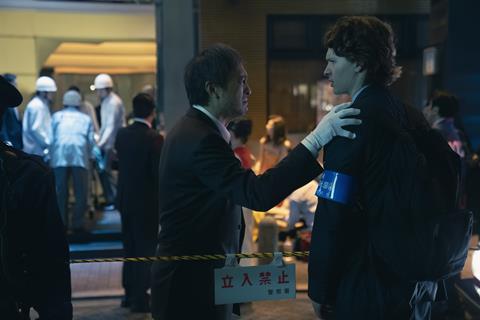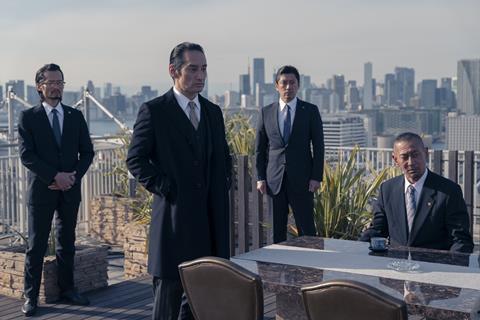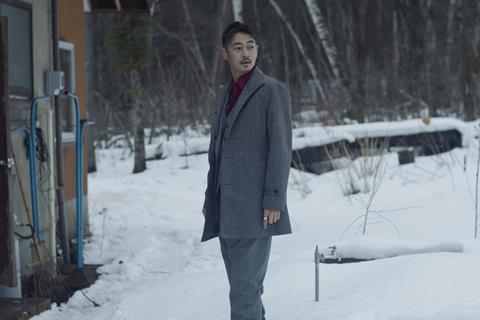
When HBO returned to Japan in November 2022 to film the second season of Tokyo Vice, it was determined to film much more on location than it had been able to the first time around.
“Even though people felt season one showed a lot of the city, it wasn’t enough for me,” says Tokyo Vice’s executive producer and director, US-based Alan Poul.
Filming on the first season had to shut down due to the Covid-19 lockdown in Japan, just six days into production on the pilot episode. It was able to resume eight months later, with full Covid protocols in place but to a city not fully back to life.
“Along with our line producer [UK-based] Alex Boden, we were able to make great inroads with certain areas of the Japanese government and get a lot more official support,” says Poul, who is well versed in the language, culture and history of Japan. Compared to season one, “it was night and day.”
Tokyo Vice stars Ansel Elgort as a US journalist at Tokyo’s largest newspaper investigating the Japanese underworld through his informal partnership with a local detective, played by Ken Watanabe. The series is produced by US-based Fifth Season with Japan’s WOWOW.
With more local support and fewer Covid restrictions, Poul and his team were able to delve into deeper districts of Tokyo. One thing they learned from season one, Boden says, was “we brought the locations team on much earlier so that they could do their job properly. They’re working for months to prep those locations.”

The team including Poul, supervising location manager Japan-based Masanori Aikawa, and cinematographer US-based Corey Walter, scoured the script for each location. Aikawa prepared all the candidates, “regardless of how difficult it might be to secure them,” Aikawa says through an interpreter.
They knew securing locations can be difficult regardless of how big the budget is. “If you come in as a big film company, even if you spend a lot of money, if you break things and step on people and cause damage in relationships, it’s a net negative,” says Poul.
Aikawa managed a team of location scouts. When one would secure a location they would then manage it personally throughout the shoot. “In Japan, you need an individual interaction with each shop owner, for example,” Aikawa explains.
Boden adds: “The most we normally do [on other productions] is put letters through mailboxes and speak to the critical neighbours. [On Tokyo Vice] our team spoke to every single person and got their permission. In a block of 36, they’ll speak to someone in each of the 36 apartments.”
In a first for a Western production, the team managed to shoot in Akasaka, one of Tokyo’s busiest nightlife districts, shutting down the street entirely. “It was the result of six months of negotiation on the part of our team,” said Poul. “Traditionally, a production will film in [Tokyo suburb] Yokohama , or one of the cities around Tokyo, and then dress it to look like it’s Kabukicho or Akasaka.”
For Poul, this wasn’t an option, as “It was a huge priority that Japanese viewers would not look askance at the show,” he adds.
The reputation earned from season one helped the team when filming on the ground. “The show itself has become more popular among the people, and [as a result] there have been places that actually softened up and became easier to shoot in,” Aikawa says.

This also allowed them to cast a broader net, with filming taking place on location in the snowy region of Nagano. Interiors across both seasons were filmed predominantly at the Tokyo-based Toho Studios, with production on season two wrapping in May 2023.
Cinematographer Corey Walter said the whole team worked by an ethical code, “Not only for ourselves, but for future shoots, so we’ll all be able to come in and have a good experience.”
Poul describes it as a sea change. “We really were poised to take maximum advantage of that shift in our status,” he says.
Aikawa, who runs Tokyo Rock Studio, specialising in international productions, hopes the success of filming two series of Tokyo Vice in Japan galvanises the local locations sector and makes it more open to facilitating incoming shoots.
“[There is now] a basic understanding [of what production truly entails] at a higher level,” he says.
Ambivalence towards filming in Japan doesn’t just come from the Japanese, reveals US-based Todd Sharp, president of production at Fifth Season, which produced the show.
“There were a lot of people in the US who said ‘Why don’t you shoot all of your stage work and all of your interiors somewhere else? Then all you do in Tokyo is what is required in Tokyo,’ which would basically be your exteriors,” Sharp recalls. “But we did not want to do that. We wanted authenticity, we wanted cultural respectfulness, and we also thought… we can pull this off.”






![The Brightest SunScreen[Courtesy HKIFF]](https://d1nslcd7m2225b.cloudfront.net/Pictures/274x183/3/5/0/1448350_thebrightestsunscreencourtesyhkiff_312678.jpg)


















No comments yet